GALLUP NEWS SERVICE
PRINCETON, NJ -- This past Saturday, March 19, marked the second anniversary of the start of the war in Iraq. Americans are now divided in their overall support for the war, in their ratings of President George W. Bush's handling of it, and in their views of how things are going in Iraq. This is a much different picture from what Gallup found at the start of the war, when the vast majority of Americans supported the United States' efforts in Iraq. Americans have become much more positive, however, in their overall view of Iraq as a country, although the majority still has an unfavorable opinion of Iraq.
Americans Split in Support for War
Over the past two years, Gallup has tracked three key measures to gauge public support for the war in Iraq. At the start of the war, the vast majority of Americans supported the war efforts. By the summer of 2003, after the president had declared victory in Iraq and the fighting continued in cities throughout the country, support for the war began to diminish. Last year, on most measures, Americans were closely divided in their views of the war, but were generally more negative than positive in their assessment of the conflict. For the past few months, Americans have been divided on all three of these measures.
1. In view of the developments since we first sent our troops to Iraq, do you think the United States made a mistake in sending troops to Iraq, or not?
The latest CNN/USA Today/Gallup poll, conducted March 18-20, finds that a slim majority of Americans, 51%, say it was not a mistake to send troops to Iraq; 46% say it was a mistake.
When the war started, only 23% of adults nationwide said it was a mistake to send troops to Iraq, while three-quarters of respondents said it was not a mistake. The percentage of Americans saying it was a mistake gradually increased, and by the end of 2003, reached the 40% range. It was not until the summer of 2004 when a majority of Americans first said it was a mistake to send troops to Iraq.
The more recent trend, since the start of 2005, shows greater fluctuation in the public's responses to this question. In January, more Americans said it was a mistake to send troops than said it was not a mistake. That changed when Americans became much more positive about the situation in Iraq following the elections in that country at the end of January, with the majority (55%) saying it was not a mistake and 45% saying it was. Since then, positive assessments have receded somewhat, but remain more positive than at the beginning of the year.
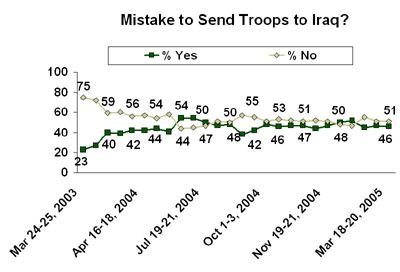
2. Do you favor or oppose the U.S. war with Iraq?
Forty-seven percent of Americans support the U.S. war with Iraq; the exact same percentage opposes it.
Gallup asked this question seven times in March and April 2003. The vast majority of Americans supported the war at that time, with support ranging from 68% to 72%. When Gallup asked this question again in October 2003, support had declined, but a majority of Americans, 54%, still supported it. Last November, following Bush's victory in the presidential election against Massachusetts Sen. John Kerry, Americans were divided in their reaction to the war. This same divide remains today.
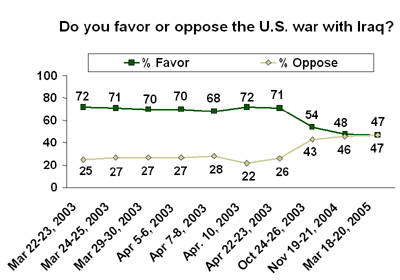
3. All in all, do you think it was worth going to war in Iraq, or not?
Another question Gallup has used to measure the public's feelings about going to war asks whether the war was "worth it," or not.
At the start of the war, two in three Americans said it was worth going to war in Iraq. At least half of all Americans expressed this sentiment until the end of January 2004. Since that time, the results of this question have fluctuated significantly, ranging from a low of 44% to a high of 56% saying it was worth it. Most recently, Americans have been divided on this measure. According to a Feb. 7-10 poll, 48% say it was worth going to war, while 50% say it was not.
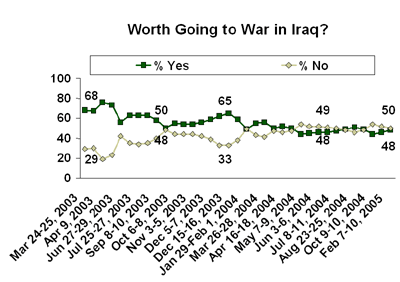
Public Also Divided on How Things are Going in Iraq
A slight majority of Americans, 52%, say things are currently going well for the United States in Iraq, while 45% say things are going badly. These results show little change from early February, when they became more positive right after the elections in Iraq took place. Throughout 2004, the public tended to say things were not going well in Iraq.
Gallup first asked this question a month after the war in Iraq started. At that time, 85% said things were going well in Iraq. Views on the war stayed at this level until the end of May 2003, at which point Americans became less likely to say things were going well.
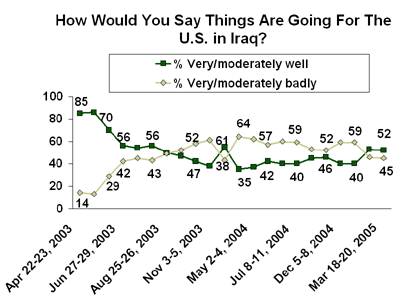
When asked who is winning the war in Iraq, 43% of Americans say the United States is winning, while 7% say the insurgents in Iraq are winning. Slightly fewer than half of Americans, 48%, say neither side is winning.
|
Who do you think is currently winning the war in Iraq? |
||||
|
U.S. and |
Insurgents |
Neither |
No |
|
|
2005 Feb 25-27 |
43% |
7 |
48 |
2 |
|
2004 Nov 19-21 |
44% |
7 |
46 |
3 |
|
2004 Oct 22-24 ^ |
35% |
10 |
53 |
2 |
|
^ Asked of a half sample |
||||
At the start of the war, the overwhelming majority of Americans said the United States was winning. Only about one in five said neither side was winning, and few said Iraq was winning. (The response options on this question were changed as it became clear that the Iraqi insurgents were the United States' primary enemy in the conflict).
|
Who do you think is currently winning the war in Iraq? |
||||
|
U.S. and |
|
Neither |
No |
|
|
2003 Mar 29-30 |
74% |
1 |
23 |
2 |
|
2003 Mar 24-25 |
74% |
1 |
21 |
4 |
|
2003 Mar 22-23 |
84% |
* |
14 |
2 |
|
* Less than 0.5% |
||||
Slight Majority Disapproves of Bush's Handling of Iraq
Gallup's Feb. 25-27 poll shows that a slight majority of Americans, 53%, disapprove of the way Bush is handling the situation in Iraq, while 45% approve. Earlier in February, Americans were essentially split, with 50% approving and 48% disapproving. The current results are roughly similar to ratings Gallup measured during the past few months.
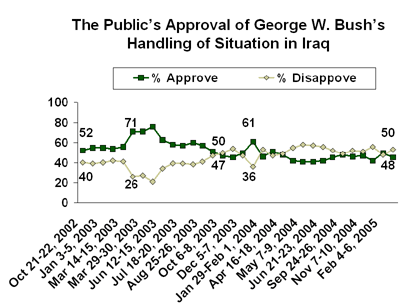
Prior to the start of the Iraq war, Bush's approval rating on Iraq was in the mid-50% range. Approval of Bush then surged once the war started, to 71% in late March 2003 and 76% in April 2003. Bush's approval on Iraq began to wane after that point, dipping as low as 41% in May 2004.
Americans More Favorable Toward Iraq This Year
Gallup periodically asks Americans if they have a favorable or unfavorable opinion of various countries around the world. Americans' opinions of Iraq have improved substantially since the war in Iraq began. From 1991 through 2003, less than 1 in 10 Americans said they had a favorable opinion of Iraq. In 2004, Iraq's favorable ratings increased to 21%. This year, the ratings increased again, this time to 29%. Still, two in three Americans in this year's survey view Iraq negatively.
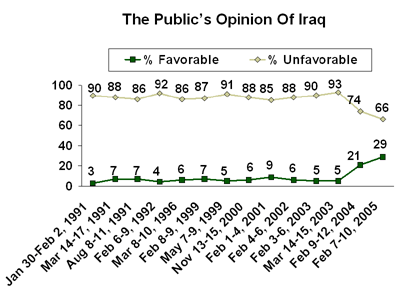
Survey Results
Results in the current survey are based on telephone interviews with 909 national adults, aged 18 and older, conducted March 18-20, 2005. For results based on the total sample of national adults, one can say with 95% confidence that the maximum margin of sampling error is ±4 percentage points. In addition to sampling error, question wording and practical difficulties in conducting surveys can introduce error or bias into the findings of public opinion polls.
